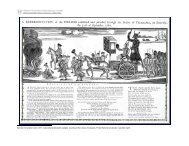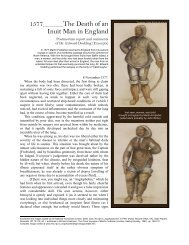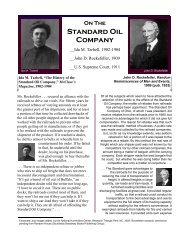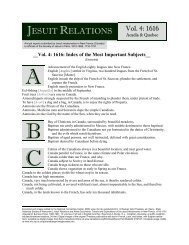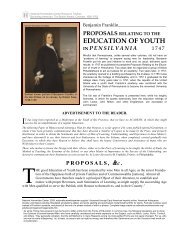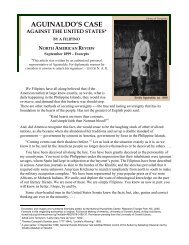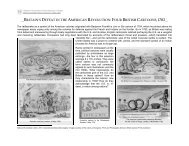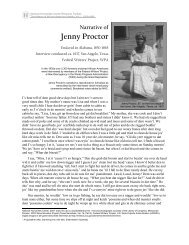Old Tenor - National Humanities Center
Old Tenor - National Humanities Center
Old Tenor - National Humanities Center
Create successful ePaper yourself
Turn your PDF publications into a flip-book with our unique Google optimized e-Paper software.
<strong>National</strong> <strong>Humanities</strong> <strong>Center</strong> Resource Toolbox<br />
Becoming American: The British Atlantic Colonies, 1690-1763<br />
Library of Congress<br />
The<br />
“<strong>Old</strong> <strong>Tenor</strong>”<br />
Affair<br />
*<br />
Massachusetts Bay Colony<br />
1751<br />
1751 proclamation by the governor of the Massachusetts Bay<br />
colony ordering the arrest of two men for publishing a ballad<br />
“wherein are contained many<br />
Expressions horribly prophane and<br />
impious, and such also as reflect the<br />
greatest Indignity and Contempt upon<br />
the Authority of the Legislature, and tend<br />
very much to weaken, if not subvert the<br />
happy Constitution of this Government.”<br />
“<strong>Old</strong> <strong>Tenor</strong>” was a nickname for paper money<br />
issued by the Massachusetts Bay colony. In<br />
1751, the colonial assembly ordered the<br />
currency removed from circulation. Paper<br />
money had been a divisive issue for decades,<br />
as is apparent in a ballad published anonymously<br />
as a broadside. “A Mournful Lamentation<br />
for the sad and deplorable Death of Mr.<br />
<strong>Old</strong> <strong>Tenor</strong>.” The ballad infuriated the governor<br />
and assembly, and a proclamation ordering<br />
the arrest of the two men who published the<br />
broadside, Robert Howland and Fobes Little,<br />
was quickly forthcoming. .<br />
The ballad and the proclamation are presented<br />
here, followed by the affidavits of two<br />
men who assert that they heard Robert<br />
Howland deliver the verses from memory.<br />
The archival track of the “<strong>Old</strong> <strong>Tenor</strong>” affair<br />
ends here. No further documentation has<br />
come to light that records the outcome of the<br />
ballad and the officials' response.<br />
* <strong>National</strong> <strong>Humanities</strong> <strong>Center</strong>, 2009: nationalhumanitiescenter.org/pds/. In Proceedings of the Massachusetts Historical Society: From January to June<br />
1874 (Massachusetts Historical Society, 1910), pp. 255-260. Complete image credits at nationalhumanitiescenter.org/pds/becomingamer/imagecredits.<br />
htm.<br />
<strong>National</strong> <strong>Humanities</strong> <strong>Center</strong> 1
<strong>National</strong> <strong>Humanities</strong> <strong>Center</strong> Resource Toolbox<br />
Becoming American: The British Atlantic Colonies, 1690-1763<br />
A MOURNFUL LAMENTATION<br />
for the sad and deplorable Death of Mr. <strong>Old</strong> <strong>Tenor</strong>, A Native of New England who, after a long Confinement, by a deep<br />
and mortal Wound, which he received above Twelve Months before, expired on the 31 st Day of Mary, 1750.<br />
He lived beloved, and died lamented. To the mournful Tune of, Chn-y-Chace.<br />
A Doleful tale prepare to hear,<br />
As ever yet was told:<br />
The like, perhaps, ne’er reach’d the ear<br />
Of either young or old.<br />
Tis of the sad and woeful death<br />
Of one of mighty fame,<br />
Who lately hath resign’d his breath;<br />
OLD TENOR was his Name.<br />
In vain ten thousands intercede,<br />
To keep him from the grave;<br />
In vain his many good works plead;<br />
Alas! they cannot save.<br />
The powers decree, and die he must,<br />
It is the common lot,<br />
But his good deeds, when he’s in dust,<br />
Shall never be forgot.<br />
He made our wives and daughters fine,<br />
And pleased every body;<br />
He gave the rich their costly wine,<br />
The poor their flip and toddy.<br />
The labourer he set to work;<br />
In ease maintain’d the great:<br />
He found us mutton, beef and pork,<br />
And every thing we eat.<br />
To fruitful fields, by swift degrees,<br />
He turn’d our desart land:<br />
Where once nought stood but rocks and trees,<br />
Now spacious cities stand.<br />
He built us houses strong and high,<br />
Of wood, and brick, and stone;<br />
The furniture he did supply;<br />
But now, alas! He’s gone.<br />
The merchants too, those topping folks,<br />
To him owe all their riches;<br />
Their ruffles, lace and scarlet cloaks,<br />
And eke their velvet breeches.<br />
He launch’d their ships into the main,<br />
To visit distant shores;<br />
And brought them back, full fraught with gain,<br />
Which much increas’d their stores.<br />
Led on by him, our Soldiers bold,<br />
Against the foe advance;<br />
And took, in spite of wet and cold,<br />
Strong CAPE BRETON from France.<br />
Who from that Fort the French did drive,<br />
Shall he so soon be slain?<br />
While they alas! remain alive,<br />
Who gave it back again.<br />
From house to house, and place to place,<br />
In paper doublet clad,<br />
He pass’d, and where he shew’d his face,<br />
He made the heart full glad.<br />
But cruel death, that spareth none,<br />
Hath rob’d us of him too;<br />
Who thro’ the land so long hath gone,<br />
No longer now must go.<br />
In Senate he, like Cæsar, fell,<br />
Pierc’d thro’ with many a wound,<br />
He sunk, ah doleful tale to tell!<br />
The members sitting round.<br />
And ever since that fatal day,<br />
Oh! had it never been,<br />
Closely confin’d at home he lay,<br />
And scarce was ever seen.<br />
Until the last of March, when he<br />
Submitted unto fate;<br />
In anno Regis twenty three,<br />
Ætatis forty eight.<br />
Forever gloomy be that day,<br />
When he gave up the ghost:<br />
For by his death, oh! who can say<br />
What hath New-England lost?<br />
Then good OLD TENOR, fare thee well,<br />
Since thou art dead and gone;<br />
We mourn thy fate, e’en while we tell<br />
The good things thou hast done.<br />
Since the bright beams of yonder sun,<br />
Did on New-England shine,<br />
In all the land, there ne’er was known<br />
A death so mourn'd as thine.<br />
Of every rank are many seen,<br />
Thy downfall to deplore;<br />
For ’tis well known that thou hast been<br />
A friend to rich and poor.<br />
We’ll o’er thee raise a SILVER tomb,<br />
Long may that tomb remain,<br />
To bless our eyes for years to come,<br />
But wishes ah! are vain.<br />
And so God bless our noble state,<br />
And save us all from harm,<br />
And grant us food enough to eat,<br />
And clothes to keep us warm.<br />
Send us a lasting peace, and keep<br />
The times from growing worse,<br />
And let us all in safety sleep,<br />
With SILVER in our purse.<br />
<strong>National</strong> <strong>Humanities</strong> <strong>Center</strong> 2
<strong>National</strong> <strong>Humanities</strong> <strong>Center</strong> Resource Toolbox<br />
Becoming American: The British Atlantic Colonies, 1690-1763<br />
Library of Congress<br />
By the Honourable<br />
SPENCER PHIPS, Esq;<br />
Lieutenant-Governour and Commander in Chief, in<br />
and over His Majesty’s Province of the<br />
Massachusetts-Bay in New-England.<br />
A PROCLAMATION.<br />
WHEREAS there has been lately published and<br />
dispersed within this Province, an anonymous Paper<br />
in the Form of a Ballad, called, A sad and deplorable<br />
Lamentation, &c. — wherein arc contained many<br />
Expressions horribly prophane and impious, and such<br />
also as reflect the greatest Indignity and Contempt<br />
upon the Authority of the Legislature, and tend very<br />
much to weaken, if not subvert the happy<br />
Constitution of this Government: And whereas one<br />
Robert Rowland of Duxbury, and one Fobes Little of<br />
Little-Compton, are informed against for<br />
industriously publishing and dispersing, and one or<br />
both of them strongly suspected to be the Authors of<br />
the Paper aforesaid:<br />
I Do therefore, with the Advice of His Majesty’s Council, and at the Desire of the House of<br />
Representatives, hereby require His Majesty’s Justices of the Peace, Sheriffs, and other Officers, with<br />
other His Majesty’s Subjects, to use their utmost Endeavours for the seizing, apprehending and securing<br />
the said Robert Howland and Fobes Little, that so they may be brought to Justice: And for the<br />
Encouragement of the said Officers and others concerned, any Person or Persons that shall seize upon and<br />
secure the said Robert Howland and Fobes Little, or either of them, so that they, or either of them, shall<br />
be delivered up to Authority, he or they shall receive out of the publick Treasury the Sum of TEN<br />
POUNDS Lawful Money for each of the said Persons they shall so secure and deliver up as aforesaid,<br />
together with all necessary Charges.<br />
GIVEN at the Council-Chamber in Boston, the Eighteenth Day<br />
of April 1751, in the Twenty-fourth Year of the Reign of<br />
our Sovereign Lord GEORGE the Second, by the Grace<br />
of GOD of Great-Britain, France, and Ireland, KING,<br />
Defender of the Faith, &c.<br />
J. WILLARD, Secr.<br />
GOD Save the KING.<br />
By Order of His Honour the Lieutenant-Governour,<br />
with the Advice of the Council, S. Phips.<br />
BOSTON: Printed by John Draper, Printer to His Honour the Lieutenant-Governour and Council. 1751.<br />
<strong>National</strong> <strong>Humanities</strong> <strong>Center</strong> 3
<strong>National</strong> <strong>Humanities</strong> <strong>Center</strong> Resource Toolbox<br />
Becoming American: The British Atlantic Colonies, 1690-1763<br />
[C]ertain papers in the Massachusetts Archives . . . would indicate that the writer or writers of the verses<br />
sought to avoid the consequences of their act by having them printed in Rhode Island. 1<br />
Prov : of To James Warren Esq r Sheriff of the County of Plymouth<br />
the<br />
or to either of Hia Deputies<br />
Mass a<br />
Bay.<br />
Greeting<br />
In His Majesty’s Name You are hereby required and impowered forthwith to take the Bodies of Robert<br />
Howland of Duxborough Hezekiah Cane of Pembroke and Jethro Sprague of Duxbrough into your Custody<br />
and bring them before this House to give Answer for their Contempt of the Order of this House and such<br />
other matters as shall be laid to their Charge.<br />
Given under my Hand and Seal in the Chamber of the House of Representatives this Ninth Day of April.<br />
Anno Domini 1751. And in the 24th Year of His Maj es Reign<br />
T. HUBBARD Spk. r<br />
The following entry of the return of this warrant is endorsed on the back of it:<br />
Plym o ss April y e 10 : 1751<br />
then persuant to Warrant I have tuck the Bodeys [of] y e with In Named Hezekiah Keen and Jethro<br />
Sprage and them Brout Before the Honorabel house of Representifes and I have made deligent<br />
Sarch for the with[in] named Robert howland and Cold not find him with in my present [precinct]<br />
pr JOSEPH JOSSELYN<br />
Dep t Sheriff<br />
Nath. l Churchill of Plymouth of lawfull age testify’s & says that he was at the house of Jethro<br />
Sprague in Duxborough on Monday 11th March past, where were severall Persons & being askt by s d<br />
Sprague whether he had ever heard the Verses on the Death of <strong>Old</strong> <strong>Tenor</strong> I told him no, whereupon<br />
he desired us to sit down & we should, upon this he called upon one Robert Howland who was then at<br />
Spragues house, smoaking his pipe, to say or repeat them, at first he seemed somewhat backward,<br />
but afterwards taking his pipe out of his mouth, he repeated in the hearing of myself & severall other<br />
persons then present a Number of Verses, on the Lamentation of the Death of <strong>Old</strong> <strong>Tenor</strong>. Afterwards<br />
Joseph Morton & myself went out of the House in order to pursue a person who had broke out of<br />
Plymouth Goal [sic; Jail] & (as we heard) was in Duxbury, said Howland told us he was going that<br />
way & would show us the House where y ẹ person was, & as we were rideing along, he heard the s d<br />
Howland tell s d Morton, that the s d Verses were gone severall weeks before, to R d Island in order to<br />
be printed & that he believed he would hear more of them hereafter; And since that I have seen some<br />
Verses printed, which according to the best of my remembrance I verily believe to be the same I<br />
heard repeated by the s d Robert Howland, which contained severall very hard reflections on the<br />
Generall Court I further say not<br />
NATHANIEL CHURCHEL<br />
SUFFOLK SS. BOSTON 1st April 1751.<br />
Nath l Churchill appeared & made solemn oath that the above Deposition by him subscribed is just & true Before me<br />
T. HUBBARD J Peace<br />
In the affidavit of Joseph Morton, Jr., of Plymouth, to the same effect, he states that on the “fryday or Saterday<br />
following [March 11, 1751] Thomas Foster Esq r Shew me a printed Copy of Verses which I took to be . . . the Same<br />
Verses.” It also appears that there were two or three sets or renderings of these doggerel lines, and it is likely that the<br />
more offensive were not contained in the printed sheet.<br />
1 Proceedings of the Massachusetts Historical Society: From January to June 1874 (Massachusetts Historical Society, 1910), pp. 259-260.<br />
<strong>National</strong> <strong>Humanities</strong> <strong>Center</strong> 4


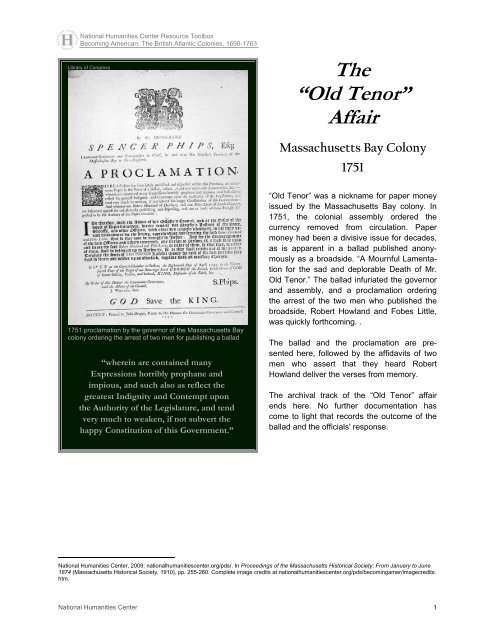
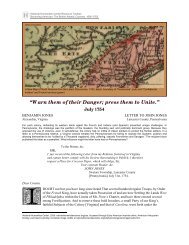
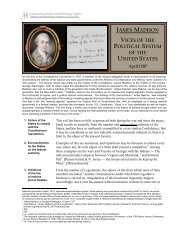
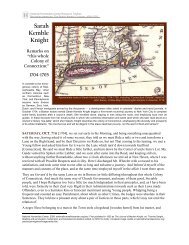
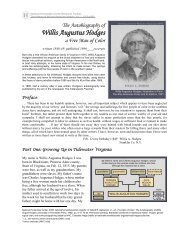
![The Requerimiento [Requirement], Council of Castile, 1510 ...](https://img.yumpu.com/21979685/1/190x245/the-requerimiento-requirement-council-of-castile-1510-.jpg?quality=85)
